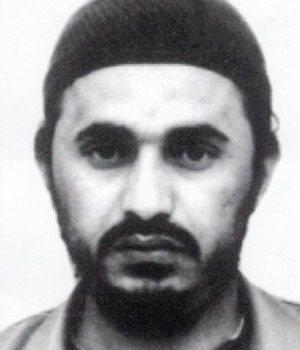
This is an undated photo released in Amman, Jordan, Dec. 14, 2002, of Jordanian-born terrorist mastermind Abu Musab al-Zarqawi (AP)
BAGHDAD, (Reuters) – The killing of Abu Musab al-Zarqawi is a “new beginning” for Iraq, the interior minister said on Friday, as authorities enforced a traffic ban in an apparent effort to prevent al Qaeda reprisal attacks.
The Interior Ministry said the ban in Baghdad and in the volatile town of Baquba, near where U.S. warplanes killed Zarqawi on Wednesday, would be in effect from 11 a.m. (0700 GMT) until 3 p.m., when most Iraqis go to mosques for Friday prayers.
Suicide car bombers sent by Zarqawi have targeted Shi’ite mosques in the past as part of a campaign to plunge Iraq into sectarian civil war and the traffic ban, although not uncommon on Fridays, may indicate that authorities are fearing attacks.
In a strike that President George W. Bush said could help to turn the tide against the insurgency, two U.S. 500-pound (227 kg) bombs killed Zarqawi in a rural area near Baquba, 65 km (40 miles) north of Baghdad, on Wednesday.
Highlighting the boost of confidence among American and Iraqi officials prompted by Zarqawi’s death, Interior Minister Jawad al- Bolani told Iraqiya state television: “Killing Zarqawi is a new beginning for Iraqi security and establishing peace between the different components of society.”
But U.S. officials, struggling to defeat an insurgency that has sowed mayhem in Iraq with car bombs, beheadings and kidnappings more than three years after the U.S. invasion, have warned against expectations of an quick end to violence.
Hours after U.S. and Iraqi officials announced the death of America’s most wanted man in Iraq, a string of bombs in Baghdad on Thursday killed at least 31 people and wounded scores, including a roadside bomb that killed 13 in a crowded market.
While warning of “tough days ahead,” Bush said the air strike “delivered justice to the most wanted terrorist in Iraq”.
In one of the most significant developments in Iraq since the capture of Saddam Hussein in 2003, Jordanian-born Zarqawi was killed on Wednesday in a joint U-S.-Iraqi operation helped by tip-offs from Iraqis and Jordanian intelligence.
The news coincided with a political breakthrough as parliament approved Prime Minister Nuri al-Maliki’s candidates to become the new defence and interior ministers after long and intense wrangling among his coalition government partners.
Vowing to fight on, al Qaeda in Iraq confirmed the death of Zarqawi, who beheaded several hostages himself. The Sunni Arab, who had a $25 million bounty on his head, had declared war on Iraq’s majority Shi’ites, threatening a full sectarian conflict.
The U.S. military released pictures of the corpse of the bearded Zarqawi with facial abrasions and eyes closed. The air strike was carried out by two F-16 warplanes, one of which dropped two guided bombs onto Zarqawi’s “safe house”.
Osama bin Laden called Zarqawi, who was in his late 30s, the prince of al Qaeda in Iraq, and he had symbolised the radical Islamist insurgency against U.S. occupation.
U.S. special forces were involved in trailing Sheikh Abdul-Rahman, Zarqawi’s spiritual adviser, to uncover Zarqawi’s presence in a small house in a palm grove. Abdul-Rahman was also killed in the air strike.
“(Zarqawi’s death provides) an opportunity for Iraq’s new government to turn the tide in this struggle,” Bush told a news conference in the Rose Garden at the White House.
“We have tough days ahead of us in Iraq that will require the continued patience of the American people,” said a sombre-looking Bush, battling low poll ratings, partly over Iraq.
Followers of Zarqawi pledged to carry on their fight. “The death of our leaders … only makes us more determined to continue the jihad,” said an Islamist Web site statement.
U.S. Defense Secretary Donald Rumsfeld told reporters 10 people, including Zarqawi, had been killed in the strike. Earlier, officials said six people including a woman and a child had been killed.
Zarqawi was identified by his fingerprints and tattoos.
U.S. Major General William Caldwell said an Egyptian militant trained in Afghanistan called Abu al-Masari, who established the first al Qaeda cell in Baghdad, may succeed Zarqawi as head of the group in Iraq.
Caldwell told reporters the operation to track down Zarqawi had taken many weeks. “It truly was a very long, painstaking, deliberate exploitation of intelligence, information gathering, human sources, electronics, signal intelligence,” he said.

US President George W. Bush makes a statement on the death of Iraq’s terrorist leader Abu Musab Al-Zarqawi in the Rose Garden of the White House in Washington, DC 08 June 2006 (AFP)

Iraqi police officers and an elderly woman fire guns in the air to celebrate the news that Abu Musab al-Zarqawi, al-Qaeda’s leader in Iraq has been killed in an air raid north of Baghdad, (AP)
